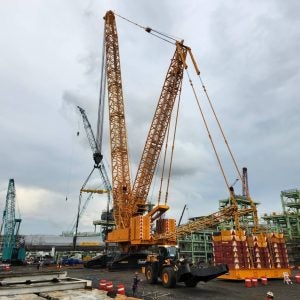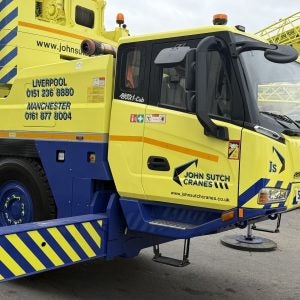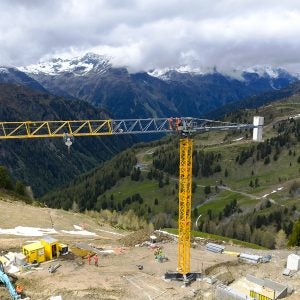Despite pessimistic general market forecasts, Wolffkran managing partner Peter Schiefer is upbeat about the prospects for construction in Germany in 2009. “In Germany and Switzerland, real estate developers can still get money, credit, and have new projects started. In Germany, Austria and Switzerland, infrastructure work is still continuing.” He adds that although he expects large residential projects to slow down, but from a relatively low start.
For tower crane rental, prospects are not that bad, Schiefer says. “If I look at the utilisation in our rental fleet, and our levels of current and ongoing enquiries, business is a bit slower, but very much alive with new work coming on.”
When Schiefer and Hans-Peter Koller bought the tower crane manufacturer Wolffkran in 2005 from previous owners MAN, they kept the company’s philosophy of renting as well as selling cranes. The company has six branches and a fleet of 250–300 tower cranes in Germany. The branches also sell.
German crane end users generally do not like to own cranes, says Schiefer. “Construction companies have been burned by the ups and downs in German real estate. It is a matter of the balance sheet and financing for them.”
“I like the combination of sales and rental. We can offer more to customers. Customers basically pick and choose for their situation. Some customers own a fleet of Wolffs but when it comes to a special situation, whether because of height, or because the crane needs to be freestanding, they might just go and rent some components.” He adds that having branches that rent and sell direct to end users “is an important part of our success, to know the customers and market demand well. In my eyes we can only accomplish that if we have a rental fleet.”
Tower crane rental has been good for Hamburg, Germany-based Potain dealer Siloco, says managing director David Sengelmann. He says that the last 12 months have been the best for his business in 15 years, and that all his fleet is out on rental until mid-2009.
There are sound economic reasons favouring rental, argues Sengelmann. The company, which has a fleet of 95 towers, is 90% rental, and Sengelmann acknowledges that Wolffkran is a big competitor. First, rental costs a fraction of the capital cost of a crane. “Roughly, our monthly rental price does not exceed 3% of the buying price. Thus if we, as a rental company, are able to rent the crane out for 10 months, we pay 30% of the crane in a year, paying for it completely in around three years. Our clients, building companies, normally cannot provide 10 months’ work for their machines. Hence, renting the machines is much cheaper for them (apart from other advantages).”
Second, he says, the current market situation pushes the business more strongly toward rental. “Due to now weak demand and tower cranes’ traditionally weaker position in Germany than self erecting cranes, Potain pushes its tower market by renting out its stocks very cheaply. Thus we are able to offer clients such cheap monthly rental prices that buying a crane is out of the question,” Sengelmann says.
The situation has changed suddenly in the second half of 2008. Over the last five years, the principal pattern has been a lack of cranes. “In Germany, 10 years ago, there were thousands of cranes. They have disappeared over the last six to seven years, and two or three years ago [the market] reached a real bottom,” says Schiefer. “A lot of equipment went out of the German market, into Eastern Europe and the Middle East.”
Since then, the global construction boom also limited delivery of new cranes into Germany, says Sengelmann, which helped some smaller brands extend their reach in Germany. He adds that he has noticed that local player Wilbert, the German rental company turned manufacturer, has also had an influence on the German market.
Cranes from Spain
Another new source for new cranes might be Spain. As the Spanish construction industry has collapsed, thousands of used Spanish tower cranes have sat idle, as have the production lines of some Spanish manufacturers. But both men say that they have not seen Spanish cranes in Germany. Sengelmann says that design differences, particularly short jib lengths, limit Spanish cranes’ entry into the German market, but not into neighbouring Poland, where Siloco has a branch. It has witnessed a competitor selling many Spanish cranes.
Schiefer says that were Spanish companies to enter the German market, they would have to rent, or find a rental company to sell cranes to; such a company would have to be basically a startup, he says, which, in the current market conditions, would have a hard time getting financing to buy the cranes. He puts it simply: “If you want to be in Germany, you need to rent.”






